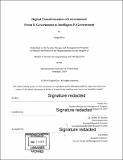| dc.contributor.advisor | Donna H. Rhodes. | en_US |
| dc.contributor.author | Koo, Eunjin. | en_US |
| dc.contributor.other | Massachusetts Institute of Technology. Engineering and Management Program. | en_US |
| dc.contributor.other | System Design and Management Program. | en_US |
| dc.date.accessioned | 2019-07-18T20:29:42Z | |
| dc.date.available | 2019-07-18T20:29:42Z | |
| dc.date.copyright | 2019 | en_US |
| dc.date.issued | 2019 | en_US |
| dc.identifier.uri | https://hdl.handle.net/1721.1/121792 | |
| dc.description | Thesis: S.M. in Engineering and Management, Massachusetts Institute of Technology, System Design and Management Program, 2019 | en_US |
| dc.description | Cataloged from PDF version of thesis. | en_US |
| dc.description | Includes bibliographical references (pages 87-92). | en_US |
| dc.description.abstract | The wave of the fourth industrial revolution leads us to an intelligent information society by spreading intelligent information technology (Al, IoT, Cloud, Big Data, etc.) to almost every aspect of our lives, such as industry, economy, culture, society, etc. As the fourth industrial revolution accelerates, it is crucial to establish an innovative strategy for Government that utilizes these technologies. Notably, to keep up with the changes in the intelligent information society, it is necessary to make a significant transformation of the current E-Government operation or E-Government service delivery. Therefore, this thesis focuses on the transformation to an intelligent E-Government, a new concept of E-Government that has absorbed intelligent information technology. Specifically, this thesis: 1) Analyzes the current E-government system using the ARIES framework and several other techniques, and examining the necessity of the transformation to an intelligent E-Government system. 2) Explores a successful transformation strategy to an intelligent E-Government from the organizational and political perspectives, and finally, 3) Proposes recommendations for how to implement an intelligent E-Government from a technical point of view. The expectations of citizens for government services are multiplying. Also, the emergence of the intelligent information society, the appearance of various new technologies, and the limitations of the current E-Government system require an improvement of the existing E-Government system. The primary goal of this thesis is to investigate a concrete and feasible plan for how to successfully transform the E-Government system in line with the evolution of technology. | en_US |
| dc.description.statementofresponsibility | by Eunjin Koo. | en_US |
| dc.format.extent | 92 pages | en_US |
| dc.language.iso | eng | en_US |
| dc.publisher | Massachusetts Institute of Technology | en_US |
| dc.rights | MIT theses are protected by copyright. They may be viewed, downloaded, or printed from this source but further reproduction or distribution in any format is prohibited without written permission. | en_US |
| dc.rights.uri | http://dspace.mit.edu/handle/1721.1/7582 | en_US |
| dc.subject | Engineering and Management Program. | en_US |
| dc.subject | System Design and Management Program. | en_US |
| dc.title | Digital transformation of Government : from E-Government to intelligent E-Government | en_US |
| dc.type | Thesis | en_US |
| dc.description.degree | S.M. in Engineering and Management | en_US |
| dc.contributor.department | Massachusetts Institute of Technology. Engineering and Management Program | en_US |
| dc.identifier.oclc | 1103445153 | en_US |
| dc.description.collection | S.M.inEngineeringandManagement Massachusetts Institute of Technology, System Design and Management Program | en_US |
| dspace.imported | 2019-07-18T20:29:37Z | en_US |
| mit.thesis.degree | Master | en_US |
| mit.thesis.department | SysDes | en_US |
